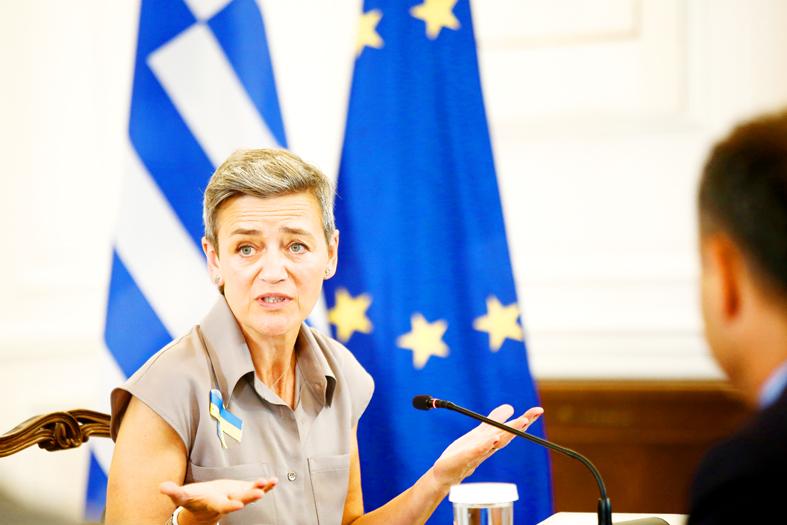EU lawmakers on Thursday agreed on new powers to vet foreign investments and block state-backed companies from making unfair inroads into the EU market.
Once in force, the new rules would give EU competition authorities fresh abilities to probe foreign companies seeking to snap up EU-based firms or public contracts.
The rules do not specifically mention China, but they land as ties between the bloc and its biggest trading partner are at a low point and they are largely understood to be targeting Beijing.

Photo: EPA-EFE
The final legal text was negotiated between members of the European Parliament, the European Commission and negotiators from France, which holds the EU’s rotating six-month presidency until yesterday.
“We are closing the French presidency with an agreement on our proposal for foreign subsidies,” European Commissioner for Competition Margrethe Vestager wrote on Twitter.
“This is fairness. We control state aid within the EU and now we want to make sure that European economies are not undermined by foreign subsidies,” she added.
The text now needs final ratification by the EU’s 27 member states, as well as a plenary session of the European Parliament, where opposition is unlikely.
Vestager said that given the time needed to staff the commission to face its new responsibility, the instrument should come into force only in the middle of next year.
Under the new rules, the bloc’s powerful antitrust authority would investigate state-backed foreign companies seeking to acquire EU businesses with an annual turnover of more than 500 million euros (US$523 million).
State-aid investigations would also be launched into subsidized companies bidding for large public contracts in Europe, such as in rail or telecommunications, worth more than 250 million euros.
If necessary, Brussels would be able to implement corrective measures to remedy possible distortions of competition, and in some cases even prohibit a merger or the award of a public contract to the company concerned.
“The agreement reached on this new instrument will make it possible to combat unfair competition from countries that grant massive subsidies to their industry,” French Minister of Finance Bruno Le Maire said in a statement.
“This is a major step towards protecting our economic interests,” he added.
In an effort to placate accusations of protectionism, the law also commits the EU to continue pushing for stronger international rules against distortive subsidies, notably via a reform of the WTO.
The American Chamber of Commerce to the EU — backed by similar associations from South Korea, India, Australia and Japan — has expressed doubts about the law, saying that it would create red tape and inflict legal uncertainty.
The new rule “poses a significant administrative burden on EU and non-EU businesses alike by introducing wide-ranging notification requirements and lengthy investigation periods,” a statement earlier this month said.

KEEPING UP: The acquisition of a cleanroom in Taiwan would enable Micron to increase production in a market where demand continues to outpace supply, a Micron official said Micron Technology Inc has signed a letter of intent to buy a fabrication site in Taiwan from Powerchip Semiconductor Manufacturing Corp (力積電) for US$1.8 billion to expand its production of memory chips. Micron would take control of the P5 site in Miaoli County’s Tongluo Township (銅鑼) and plans to ramp up DRAM production in phases after the transaction closes in the second quarter, the company said in a statement on Saturday. The acquisition includes an existing 12 inch fab cleanroom of 27,871m2 and would further position Micron to address growing global demand for memory solutions, the company said. Micron expects the transaction to

Vincent Wei led fellow Singaporean farmers around an empty Malaysian plot, laying out plans for a greenhouse and rows of leafy vegetables. What he pitched was not just space for crops, but a lifeline for growers struggling to make ends meet in a city-state with high prices and little vacant land. The future agriculture hub is part of a joint special economic zone launched last year by the two neighbors, expected to cost US$123 million and produce 10,000 tonnes of fresh produce annually. It is attracting Singaporean farmers with promises of cheaper land, labor and energy just over the border.

US actor Matthew McConaughey has filed recordings of his image and voice with US patent authorities to protect them from unauthorized usage by artificial intelligence (AI) platforms, a representative said earlier this week. Several video clips and audio recordings were registered by the commercial arm of the Just Keep Livin’ Foundation, a non-profit created by the Oscar-winning actor and his wife, Camila, according to the US Patent and Trademark Office database. Many artists are increasingly concerned about the uncontrolled use of their image via generative AI since the rollout of ChatGPT and other AI-powered tools. Several US states have adopted

A proposed billionaires’ tax in California has ignited a political uproar in Silicon Valley, with tech titans threatening to leave the state while California Governor Gavin Newsom of the Democratic Party maneuvers to defeat a levy that he fears would lead to an exodus of wealth. A technology mecca, California has more billionaires than any other US state — a few hundred, by some estimates. About half its personal income tax revenue, a financial backbone in the nearly US$350 billion budget, comes from the top 1 percent of earners. A large healthcare union is attempting to place a proposal before